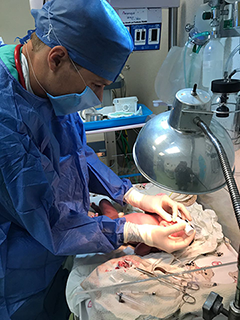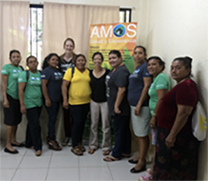Enjoy the rewards of international service in the pediatric residency program at The University of New Mexico (UNM) Health Sciences. Residents receive $1,000 to $2,000 of support to pursue rotations in foreign countries during their second and third years of training. You’ll gain a sense of achievement and perspective that can enhance your practice of medicine for life.
The UNM Children’s Hospital Child Health International Program (CHIP) provides funding for the rotation. Funds come through a Tom Dooley Heritage endowment and the New Mexico Pediatrics Society.
Email Laura Carr, MD, director of CHIP, for more information.
 Ross Newman, MD
Ross Newman, MD
During the summer of my third year of residency, I was able to extend my cultural and medical training by spending a month practicing pediatrics in the Yucatan Peninsula of Mexico. Through the CHIP program, I was able to work in a small public hospital in Tizimin, Yucatan, Mexico.
There I worked alongside excellent pediatricians who treated their patients without many of the modern comforts we deem necessary in medicine in the United States. It taught me reliance on clinical reasoning and physical exam instead of relying on the lab and imaging to diagnose and treat.
I additionally learned many of the cultural aspects to treating and working with the Hispanic population, which was invaluable as I hope to continue to work with these populations throughout my career.
 Christal Chow, MD
Christal Chow, MD
Through CHIP, I was able to volunteer with a nonprofit organization based outside of Managua, Nicaragua. I worked on various projects dedicated to providing both health care to its nearby residents and health education to its established community health worker program.
In the mornings, I saw patients in the local clinic. Working with a local provider, we treated mild dehydration from presumed dengue or chikungunya infections, diagnosed asthma, and referred patients with severe developmental delay. I learned about the available treatment options and how to treat patients when resources became limited.
In the afternoons, I worked with the health promoters. Based on their needs, I lectured about pediatric respiratory illnesses, anemia and a lot about simple nutrition. Soda is very common in Nicaragua, but after I counted out the amount of sugar in a single bottle, the health promoters refused soda for the rest of my visit.
I also had the opportunity to stay in a few very rural communities. The organization had implemented a pilot nutrition project the year before, and I was part of a team that gathered follow up data. It gave me the chance to experience rural Nicaraguan life. Lights out at sunset. Beans and rice for every meal. Buckets of water carried from the well. Chatting with the neighbors. And hours away from the nearest town and doctor.
This experience solidified my interest in global health and working with underserved populations.